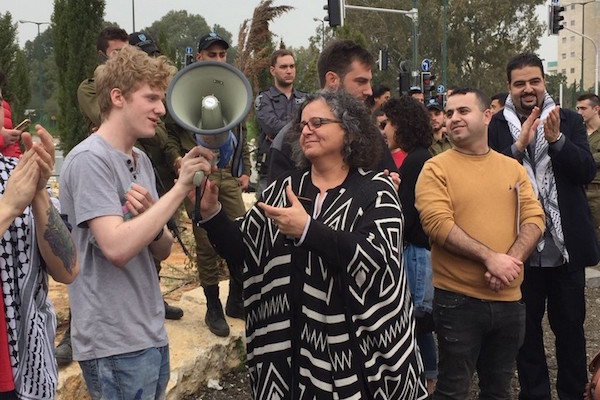Saar Yahalom and Matan Helman will serve time in prison for refusing to enlist in the army because of the occupation.

Dozens of supporters joined two Israeli conscientious objectors as they heaed to the IDF induction base Sunday to declare their refusal to join the Israeli army. Saar Yahalom, 18, from Be’erotayim, and Matan Helman, 20, from Kibbutz HaOgen, say that they will not enlist due to their opposition to the occupation. They are expected to be sentenced and imprisoned on Sunday.
For Yahalom, this is his first declaration of intent to refuse to serve in the army; he is expected to serve an extended sentence. Helman, on the other hand, has already served 50 days in three separate periods of detention. He is expected to be jailed again.
Yahalom sounded confident during a short phone conversation before he entered the induction base. “I feel calm and at peace with my decision. I feel like [my decision] can help in social struggles and in the struggle against the occupation,” he said. “I am very moved by the presence of friends who came to support me — Jews and Arabs and social activists.”
Yahalom emphasized that he had never faced pressure to refuse, and that doing so was a personal decision. “I am part of the movement for change in Israel. The struggle against the occupation, against the deportations, social struggles — they’re all part of the struggle for social justice and peace. I’m doing my part, which I chose to do. Even when I’m in prison, I trust my friends to continue the struggle, because the reality is what’s outside.”
“Most of my friends from school and work don’t agree with me,” Yahalom continued, “but they understand that my decision does not come from a desire not to contribute [to society] but rather from a principled struggle, and that I’m ready to pay a personal price for it.” Our conversation was cut short by his friends calling Yahalom to help sing The Internationale.
Among the demonstrators were MK Aida Touma-Suleiman (The Joint List, Hadash), who said, “The conscientious objectors made a difficult choice, yet the heavy price they will pay is far smaller than the price involved with participating in the oppression of another nation. A clear statement was heard on the northern border, in the south, and in the center of the country. We strongly oppose the continuation of the war, the cycle of bloodshed, and we oppose the oppression of and military control over another nation. We came here today to say that there is another path. There is the path of peace, equality, and social justice. And we chose this path.”
Helman and Yahalom, who have been supported by the Mesarvot refusers network, are among the more than 100 young people who have signed the “Seniors letter,” addressed to the prime minister, IDF Chief of Staff, and education and defense ministers, respectively. The signatories will refuse to serve in the army due to their opposition to the occupation: “To improve the lives of all of us living between the Jordan River and the Mediterranean Sea, we must end the occupation and achieve peace. For 50 years, this ‘temporary’ arrangement has continued, and we refuse to participate in prolonging it.”
In his declaration of refusal, Helman wrote: “Even the most ethical personal in the world cannot turn the occupation into something just. There is no justification for [military] rule over civilians, and there is no ethical occupation. The law requiring enlistment to an army that oppresses another nation and controls them is not a moral law. We must not be a society that blindly follows its leaders and laws when they violate our conscience and human morality. The army is a branch of the state that allows for the continuation of class and race oppression and violence. Therefore, I see it as my social contribution and moral obligation to refuse to take part in the army.”
Yahalom, in his declaration of refusal, wrote: “After 50 years of occupation, the army has become a mechanism around which everything revolves. My opposition is not to individual crimes that happen in the occupied territories, but to the occupation itself, which cannot exist without those extreme incidents. The policies of checkpoints, home demolitions, settlements, persecution of political movements, arrests, and arbitrary detentions. I am refusing because I oppose sending people of my age to serve as a colonial police force against Palestinians my age, all in the service of the pro-capitalist [neoliberal] government and the settlements.”
Yael Marom is Just Vision’s public engagement manager in Israel and a co-editor of Local Call, where a version of this article was originally published in Hebrew.
